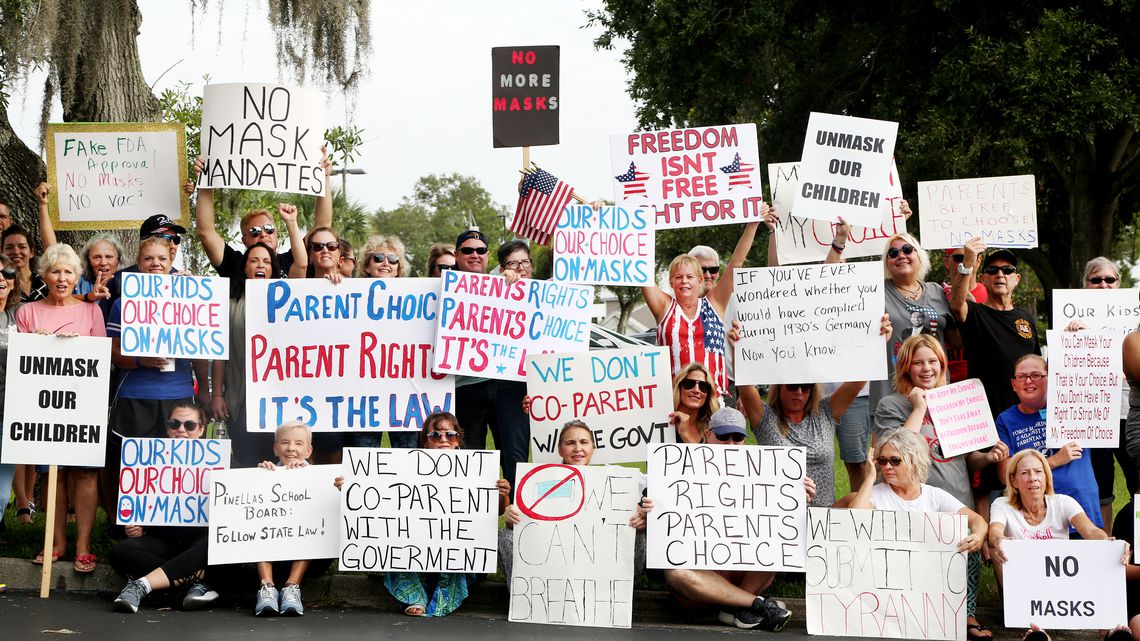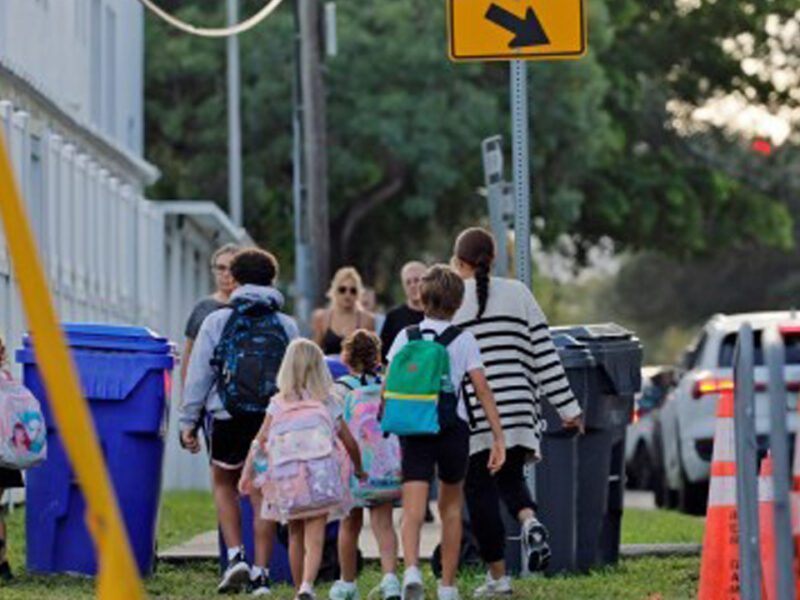Florida parents say they want rights in schools. What does that mean?
Tampa Bay Times / Jeffrey Solochek/ November 23, 2021
Earlishia Oates has plenty of reasons to demand more of the public school system.
The single mother of four recounted the times when she attended planning meetings for her son with special education needs, only to have her input ignored. She spoke passionately about how Hillsborough County district officials did little to improve schools in her east Tampa community, then tried to shutter the area charter school that makes a difference.
Lodging grievances or seeking redress isn’t easy for Oates or her working neighbors, either. It’s tough to get time off to visit campus during the day, she said, or to attend School Board meetings scheduled at often inconvenient hours.
But Oates has a different perspective than the growing segment of parents who have mobilized during the pandemic to assert what they describe as their parental rights.
Many of them, newer arrivals to the discussion, are pushing to curtail schools’ authority to make decisions for their children. They mobilized first over school masks, with their interests widening to include issues like race, gender identity and sex education that highlight America’s cultural divide.
“We have concerns we want addressed as well,” Oates said, sharing her own discontent that some fellow parents want to limit classroom discussions on race that she feels are necessary.
She wants their voices heard.
”From my perspective, parent rights give parents the right to be at the table, have a voice, be a part of the decision-making process,” Oates said. “In my community, most of the time that doesn’t happen.”
‘It’s time to get involved’
Bolstered by Florida’s Republican governor and lawmakers, many parents seek more than a seat at the table. They want the sole discretion to direct their children’s education, beyond just choosing between public and private schools.
Pinellas County parent Mary Gonzalez sends her children to a private school, but has taken time to attend School Board meetings to press for limits on masking requirements — a battle the anti-mask contingent won in the district.
“I totally support the parents who want their kids to wear it. But I do not want mine to wear it. I don’t want to stop another parent, but I don’t think I should have it forced on me,” Gonzalez said, noting she wants to send her kids to public school if conditions change.
To her friend Marie Desko, who also sends her children to private school, the concept of parents’ rights was more basic.
“What it means to me is I get to choose what is right and best for my child,” Desko said, adding that her concerns included “critical race theory,” a college-level academic framework based on America’s racial history that is drawing parent pushback at the K-12 level.
“I don’t want it prescribed to me,” Desko said, “and I don’t want my right to choose taken away from me.”
Gonzalez and Desko acknowledged schools might find it difficult to give all parents equal consideration in an environment where individual choices are unlikely to coincide all the time, and often might conflict. They said the key is to advocate for their own families, as they expect others to do, and hope at least for clear explanations of the outcomes.
“You can’t make everybody happy, unfortunately,” Gonzalez said, adding that coming to board meetings for information is an important step in asserting parent rights. “It’s time to get involved. … I’m going to put my money where my mouth is.”
A shared responsibility
Johns Hopkins University education professor Joyce Epstein has spent decades studying parental involvement in schools. She also runs the university’s Center on School, Family and Community Partnerships.
Over the years, Epstein said, she has seen that most people involved in the schools have the same desire to improve education for children. In setting strategic goals, she added, most schools adopt language stressing the importance of creating a shared experience that involves home, school and community.
It’s not always done well, Epstein said, and that’s where disputes arise.
“You have to catch questions and solve them before they become serious problems,” Epstein said. “You can’t really eliminate that there will be dramatic concerns rising here and there when people feel they haven’t been heard … or there isn’t the kind of openness that we’re trying to help schools create.”
She agreed with many who say parents know best about their children’s needs. She also noted that the experts in the schools know best about many things that parents might not be aware of, such as educational mandates or best practices.
They need to talk together, not fight. And that means both sides, she said. Topics can’t be considered off-limits, and ideas must be explored.
“When you say education is a shared responsibility, it doesn’t mean it’s only about what parents do. It doesn’t say it’s only about what schools do,” she said. “Everyone for themselves doesn’t work in any organization.”
‘People are paying attention’
Eren Dooley is a south Hillsborough County parent of four, who sued the state over its stance on school masks. She had strong worries that Florida’s ban on strict mask mandates discriminated against children like her daughter with special needs.
Dooley observed that she could have insisted on her rights to the exclusion of others. But she said she looked at the bigger picture.
“It can’t always be the kids first,” Dooley said. “We don’t live in a bubble.”
Parents might think of their efforts as advocating for their children, she said, but every parent has a voice that wants to be heard. There’s an appropriate way to go about that, Dooley said, and that doesn’t include screaming and yelling and demanding.
“It’s what is best for the whole,” she said. “It’s political doublespeak that is going on with parent rights. The good of the whole is always going to come before the individual.”
That doesn’t mean parents should not speak up, as several Pinellas County board members discussed at a recent meeting.
The board members said it’s critical that parents publicly raise questions, even if it causes tensions.
“It’s good that people are paying attention,” board member Laura Hine said.
It’s “perfectly fine” for the public to “hold our feet to the fire,” added board member Bill Dudley.
“The thing that makes our country great is our differences of opinion,” Dudley continued, saying everyone has the same goal of educating children even if they don’t always agree on how to do it. “It’s incumbent upon parents to say how they feel about it.”
Where do parents’ rights end?
Florida-based Moms For Liberty has taken a lead role getting parents — especially conservative ones — to speak out. Co-founder Tina Descovich, a former Brevard County School Board member, boiled down the group’s goal into a simple bite.
“It means we have the fundamental right to direct the upbringing, education and medical care of our children,” she said, using wording that closely adhered to Florida’s new “Parents’ Bill of Rights” law.
Descovich did not view that right as one without rails, though. Rather, it meant to her that parents “absolutely have the right to be heard,” and school officials need to listen, similar to professor Epstein’s views.
“There has to be a conversation,” she said. “Our organization is doing that, making sure all voices are heard. … Then you can debate where somebody’s rights begin and others’ end.”
The question of when schools would have the ability to override parents rights remained a “philosophical discussion that needs to be had,” Descovich said.
She acknowledged that, while parents have the right to raise questions and spark debate, they exist within a system and there’s “always a line.” Sometimes, parents might not win their arguments.
At that point, their right to direct their children’s education might mean pulling their kids out of a certain school, filing a lawsuit, relying on other choice options — not just forcing their current school to bend.
“Do whatever you need to do to protect your child,” she said, rejecting violence and threats as alternatives.
It’s complicated
So what are parent rights in schools?
Two grandparents attending a recent Pinellas County School Board meeting talked about the issue while waiting to enter the chambers. Their conversation highlighted just how complicated the issue has become.
Kyle Eaton, who called politics his hobby, said he had grave concerns about how schools teach children.
“As a result of the COVID lockdown and in-home schooling, parents became aware of some of the schooling that was going on without their knowledge,” Eaton said. “It has enlightened the parents of what has been going on in our classrooms, and it has scared a lot of people.”






